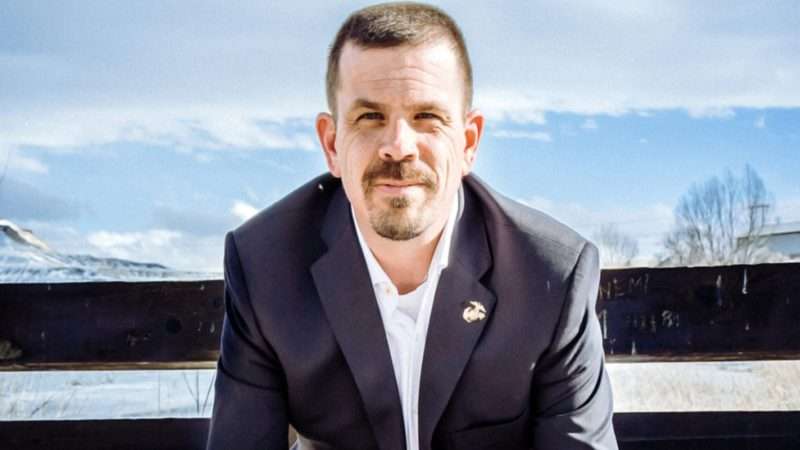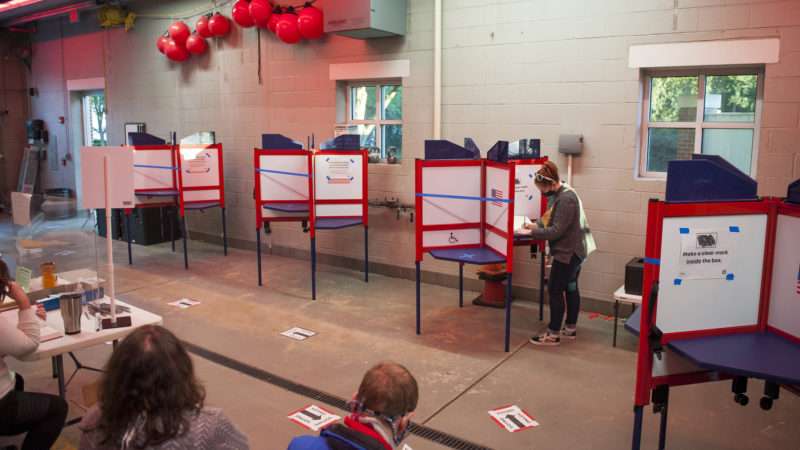Given the party’s track record, any Libertarian running for a statewide office would have to be full of almost nutty hubris to expect to win. But next year Marshall Burt will become the only sitting Libertarian state legislator, in Wyoming, and one of only five persons to ever win such a seat solely as a Libertarian. And he says he entered his race certain that he not only could but would win it.
“Being a Marine, I don’t have a notion of failure, right? I didn’t have the notion of failing or I wouldn’t have started,” Burt said in a phone interview yesterday. There were other ways he could have spent $10,000 and months of his time than on a failing political campaign, and he thinks anything less than running to win is just useless “lip service” to the cause.
Burt believed in the plausibility of the party’s “Frontier Project” model. Libertarian political operative Apollo Pazell saw that chances for actual victory likely involved races where a very small number of total votes was required to win, and where only one major party opponent was on the ballot. Pazell pushed hard this year in a handful of Wyoming races with those qualities, and Burt pushed over the top with a 276-vote edge over incumbent Democrat Stan Blake, and a total of 1,696 votes.
It’s a model that may not be not widely transferable elsewhere. Given Wyoming’s Trumpian tilt (the president got 70 percent of the vote there), it is no coincidence that the only Wyoming race the Libertarian Party actually won is Burt’s, since he was the only one up against a Democrat and not a Republican. The GOP overwhelmingly won seats both contested and uncontested for Wyoming’s state House. Despite having very high expectations for returning candidate Bethany Baldes in District 55, who lost a race in 2018 by only 53 ballots, she lost again this year, against a Republican, by 32 votes.
Burt spent nine years in the Marine Corps and currently works as a track inspector for Union Pacific railroads. Pazell recruited Burt off a party membership roll, then found his civic activism over such issues as an effort to save a local American Legion Hall in Burt’s hometown of Green River made him a good pick.
A thorough ground game—including up to eight door knocks per voter, including some uncoordinated outside help from Young Americans for Liberty canvassers—won Burt his slim victory.
Burt’s ideological backstory is not unusual for a Libertarian. He found himself “fed up with the government” for its “overreach” into Americans’ lives and fortunes, a set of intrusions he says is becoming “astronomically out of hand.” Being the kind of guy who “votes and complains,” he decided to do something about it by running for office. He saw neither major party respecting citizens’ rights sufficiently, so he went Libertarian.
Burt did, however, have to go through a couple of rounds of convincing from Pazell before Burt stopped “blowing him off” and agreed to run—after getting his wife to sign off on the idea. Burt went through meetings with other area and national Libertarian politicos to see how it could all work out before finally committing.
Burt’s local activism, on behalf of local Marines and vets and with the fire department, likely gave him a head start with local voters, since many already had some reason to know and trust him. Burt ran a largely Republican-friendly campaign that emphasized the Second Amendment, new ideas in education, and making the state more attractive to diversified industries without relying on taxes and regulations. He was especially against any attempts to pass “red flag” laws that might allow unelected officials to “come in and confiscate guns, and put the burden on the [citizen] to prove they meet legal requirements to get their guns back.”
In canvassing, Burt says he never encountered voters for whom the “Libertarian” label was a dealbreaker, and was often able to explain the party’s beliefs about freedom and less government in ways that appealed to Republican voters. The “elevator pitch” version of the message, he says, was “basically, limited government, balanced budget, do what you want in your life without being infringed upon by anyone else”; he could then “expand from that thought process” to specific issues voters might be worried about.
Burt is sure the heavy ground game was important to his victory, though he jokes that some voters may have started to feel inclined not to vote for him because they heard from him so often that it became a near nuisance. He made his home number available to voters, and he fielded many personal calls. Burt was surprised how many voters had never met his incumbent opponent or even knew who he was.
As one man without any party comrades in a 60-person legislature, Burt knows he’s unlikely to become an immediate law-passing powerhouse. But he says he’d like to try to work for a balanced budget while lessening the tax and regulatory burdens on Wyoming’s “families and children.” He says he’s already had a “cordial” discussion with the GOP majority leader but he’s not yet sure how caucusing will work as the body’s sole Libertarian.
Burt has told the Casper Star-Tribune that “I think it’s irresponsible to come out and say, ‘This is what I’m going to do in my first hundred days’ because, in reality, the Libertarian Party does not have a majority, so we do have to see how things fall in place and work with what we have available.”
Pazell says he’s learned over the years that it’s good to start with freshly recruited and trained candidates, not ones who might be stuck in old patterns. He also thinks the Libertarian Party needs more trained campaign managers to take the pressure off of him. He believes that various manpower and money problems caused by COVID-19 cost the party some likely wins, and so he hopes his strategy will bear more fruit in a pandemic-free future election. The state operation was not extraordinally expensive, with various forces—from the national and state party to individual candidates to outside support—contributing around $200,000, all told.
Wyoming allows same-day voter registration, so Pazell thinks the early surveying that led him to think Baldes could win were likely skewed by hundreds of new GOP voters coming in on Election Day to vote the party line—voters the canvassers never had a chance to persuade.
The Frontier Project’s goal, Pazell says, is to “guide candidates from activist to election then reelection” and help them to craft intelligent policy positions. Pazell’s strategic vision has earned the Libertarian Party a very rare state-level victory, and he predicts the party will “continue to grow and adapt” to new possibilities as they arise.

from Latest – Reason.com https://ift.tt/2GvOpbd
via IFTTT






